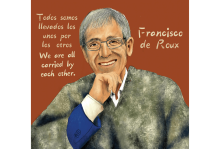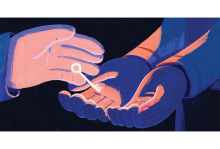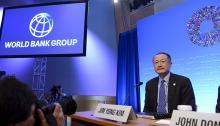adam taylor

AS WE WORKED on the three feature articles in this issue, a common theme became clear: Each of the authors, in distinctive ways and from varied points of view, was grappling with related questions: How do we take the next steps in constructing a more just church and society? What models can help guide us as we go about the work of building something new?
In an excerpt from his new book A More Perfect Union, Sojourners President Adam Russell Taylor looks to the southern African philosophy of ubuntu—interdependence—as offering wisdom that goes far beyond one-on-one relationships to a paragon for society itself. Colleen Murphy, a law professor in Illinois and an expert in issues of transitional justice, explains why making progress on racial justice requires facing the hard realities of our past. And associate editor Christina Colón talked with pastors about how their churches will be different as they enter the post-quarantine era. In their own unique ways, each author is wrestling—as all of us are called to do—with questions of what it means to put our faith into action in an uncertain world.

IN JANUARY, Sojourners entered its 50th year—a half-century of working to inspire hope by articulating the biblical call to social justice and a vision of the “beloved community.” When I began reflecting on that impending anniversary several years ago, my first thought was: “I don’t want to go back to my desk the morning after that celebration.” I also knew that I wanted Sojourners to go on long beyond the founder, and that we would need a new generation of leadership to take Sojourners into the next 50 years. When I began to think about a successor, one name kept coming to mind: Adam Russell Taylor. I met Adam 20 years ago when he was a student in my first class on faith and politics at the Harvard Kennedy School.
Adam has been involved with Sojourners for the past 20 of our 50 years. His personal story, scholarship, breadth of experience, vision, sense of vocation, and ordination in the Black church all uniquely prepare him to lead Sojourners as its first African American president. This transition has been in the works since 2016, when the board and I first selected Adam to be my successor. It’s been an amazing journey, and I’m so grateful that Adam is coming home, am very committed to his success, and I look forward to our continuing collaboration in the years ahead.
Still as founder, and now also ambassador, I will continue to write for Sojourners, record my Soul of the Nation podcast, expand my speaking engagements, offer strategic advice to Sojourners and others, and stay centrally involved with some key parts of our work—such as the convening of faith leaders in coalitions such as the Circle of Protection and the Faith Table and projects such as Lawyers and Collars in our partnership with the National African American Clergy Network.

The World Bank is teaming up with global religious leaders in a 15-year effort to end extreme poverty by 2030.
About 35 religious groups worldwide, including Bread for the World, Islamic Relief International, the Religious Action Center of Reform Judaism, and Sojourners, endorsed the call to action. Supporters include Christians, Jews, Muslims, Baha’is, and others.
“Our approach to this staggering need must be holistic, rooted in the spiritual visions of our respective faiths, and built on a shared recognition of the intrinsic dignity and value of every life on Earth,” the call said.
Observers say it’s the first time the World Bank has tapped the reach and resources of religious groups in combating extreme poverty — partly out of a realization that the work is too big for any one institution, and also in hopes of limiting unnecessary duplication between the World Bank’s ideas and those of various religious groups.
“There’s a real convergence between these dual goals of the bank and many of the commitments and convictions of religious institutions and organizations,” said the Rev. Adam Taylor, a Sojourners and World Vision alum who now oversees faith-based initiatives at the World Bank.
During an April 9 teleconference, Wold Bank President Jim Yong Kim said the number of people living in extreme poverty — living on less than $1.25 per day — has fallen from 2 billion in 1990 to 1 billion today. And he strongly believes that with enough support, that figure could be eliminated in another 15 years.
But Kim said that in order to reach the goal, there will be two important aspects to the fight to end poverty: gathering evidence on what works and what doesn’t work in combating poverty, and enlisting the aid of religious communities.
“I believe that some of the most important leaders in the movement to end extreme poverty will be people of faith, people who are motivated fundamentally to help the most vulnerable among us,” Kim said.